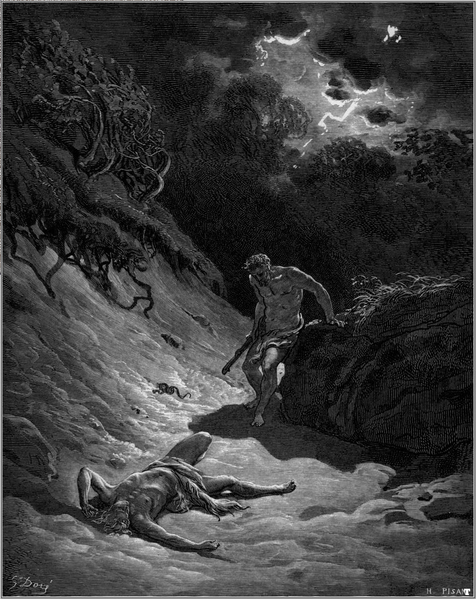 |
| The Death of Abel, by Gustave Dore |
Chapter 3 covers the story of Cain and Abel, who were the first sons of Adam and Eve. In a fit of jealousy, Cain killed Abel. Cain was scolded by God, who told Cain that as punishment he would wander the earth for life. (Thus he is interpreted to be the fore-father of the nomadic group Kenites.) Frightened, Cain told God that he, Cain, would be murdered by those who knew his deed. "Then the Lord said to him, 'Not so! If anyone kills Cain, vengeance shall be taken on him sevenfold.'" (Genesis 4:15)* This is why the Kenites, who were a brutal tribe, would kill seven people to avenge one of their own.
Of course, there are problems with the ancient interpretation that the Kenites were the descendants of Cain - according to the story of Noah, everyone but himself and his household died in the flood; thus, how did Cain's descendants survive? Unless of course one of his son's wives was a descendant of Cain? Or, as Kugel suggests, Cain was not originally meant to be the son of Adam and Eve - but that he was later incorporated into that part of the Bible.
Ancient interpreters couldn't believe that one of the first men could be so terrible as to murder his own brother, so they cast about for a reason. They settled upon this verse:
"Now Adam knew Eve his wife, and she conceived and bore Cain, saying, "I have gotten a man with the help of the Lord." (Genesis 4:1)
Why use the Hebrew word 'ish for "man" instead of the word for child? This word is never used to refer to children. Furthermore, a literal translation of the Hebrew says "I have gotten a man with the Lord." Because the word 'ish is also used to refer to angels, ancient interpreters concluded that, in this case, the word "Lord" referred to a wicked angel. Thus Cain's wickedness was explained.
Kugel says this interpretation was widely accepted in post-Old Testament times. In fact, it's referenced in the New Testament:
"By this it is evident who are the children of God, and who are the children of the devil: whoever does not practice righteousness is not of God, nor is the one who does not love his brother. For this is the message that you have heard from the beginning, that we should love one anther. We should not be like Cain, who was of the evil one and murdered his brother." (1 John 3:10-12)
*Bible quotes are from the English Standard Version
This is part of a series of posts for my upcoming Bible as Literature Group Read. To read the rest of my notes, go here.
This is part of a series of posts for my upcoming Bible as Literature Group Read. To read the rest of my notes, go here.
This sounds so interesting.
ReplyDeleteIt seems that in the story of Cain and Able is incorporated what many mystery writers and detectives know. That there has to be a motive :)
lol. Yeah, I guess that's exactly the problem. But in this case he's just plain evil.
Delete